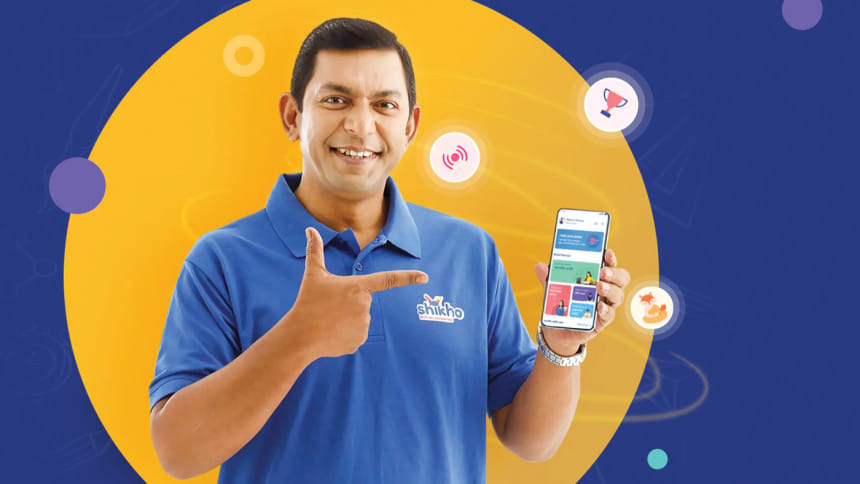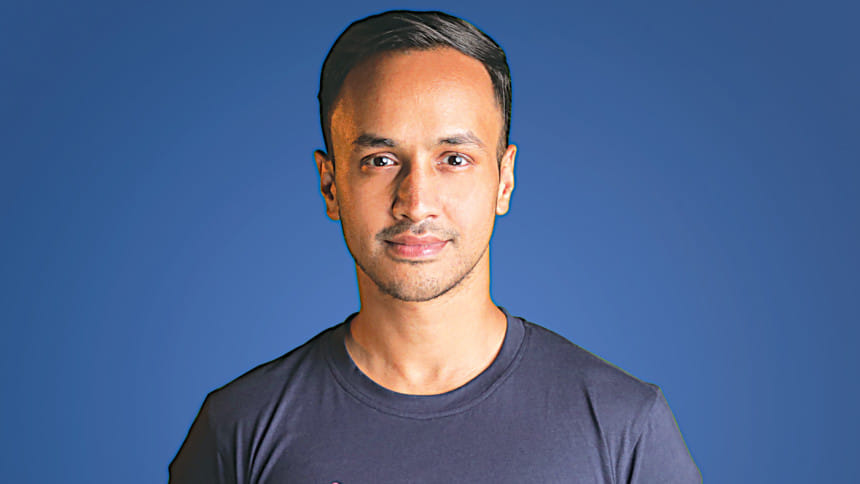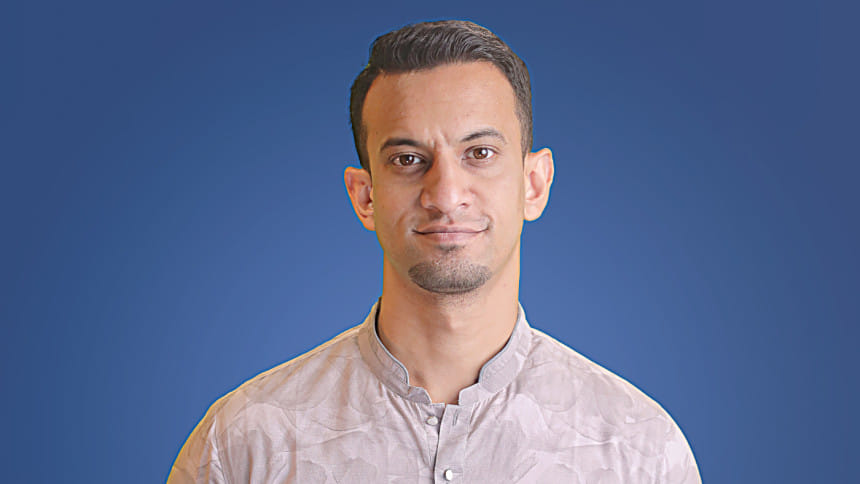Shikho: Transforming lives, one student at a time

Tanjir Arafat Turjo, 17, hops on a bus every morning, at 6:30am from his home in Banasree, Rampura, and travels over an hour to BAF Shaheen College Kurmitola, where he's currently a first-year HSC student. Most of his youth has been crammed into commuting to and back from school, leaving no room for him to pursue his passion for programming and artificial intelligence. That changed once Turjo started using Shikho, the ed-tech app launched in 2020.
"If I didn't use Shikho, I would be doing coaching after class in Kurmitola, so I would return home at around 8pm," said Turjo. He has 13 subjects for HSC, and uses Shikho's blend of online recorded content, mock tests and live classes to study for nine of them. With this flexibility, Turjo has been able to return home right after college ends, stay on top of his courses, while also finding the time to devote himself to the robotics lab. He is now the youngest member of Team Atlas, Bangladesh's national robotics team, competing with over thirty countries in the International Science and Invention Fair 2022.
Turjo is one of 800,000 students in Bangladesh, who have started using Shikho. Whereas private coaching for nine subjects would've cost Turjo Tk 6,000 each month, he now pays Tk 12,000 whole year round for all the courses. Students who cannot afford private tuition, now find a significantly more accessible support system in Shikho.
The holistic impact on students' lives is what makes Shikho standout as more than a high-tech startup, but rather as a change-making initiative in Bangladesh. Launched in 2020, Shikho's operation was run by 20 employees. Only in two years, the start-up has expanded to a team of 400 members, led by two founders who share, above all, a penchant for education.
Zeeshan Zakaria, co-founder and COO, attended seven schools, both English and Bangla medium, around Bangladesh. He went on to receive training in University College London's Institute of Education, ranked as the number one institute for education globally. Zakaria pursued teaching mathematics in high schools in Bangladesh, and it is his love for teaching and his students that distinguishes him as a distinct educator. "There is nothing more fulfilling than when a student tells me they understand a topic so much better now," said Zakaria.
Shahir Chowdhury, co-founder and CEO, grew up in Rajar Bajar, and was raised by a high school teacher and a Dhaka University professor. He spent twelve years establishing a successful career in finance in London — as a director in HSBC, prior to which he worked in Barclays. "But I realised I wasn't making the difference I wanted, in private banking and investment management," said Chowdhury. "I found myself wanting to marry up the experience of understanding finance, technology to my childhood of growing up with educators in Bangladesh," he added.
Before returning to Bangladesh, Chowdhury approached Zakaria, and Shikho was born out of their joint vision to make a difference in the education sector in Bangladesh. But their rise hasn't been without a hard-scrabble journey of its own.
"Ed-tech was a new concept in Bangladesh; the first challenge was finding a way to show parents and students that online learning can be useful," said Chowdhury. "And then there was the question of training teachers to produce content in an engaging way," he added.

Zakaria started approaching educators and experts — who now make their lessons — by visiting universities such as BUET. "I would just show up and ask to sit with them in cafeterias, and individually explain what we're trying to do at Shikho and how kids could benefit from their expertise," he recounted.
The app is now operated through a data-centric architecture by curriculum experts devising their lesson plans. Each of their courses are designed by experts in their fields — for example, the math courses are developed by mathematicians. Instead of hiring one tutor for all subjects, which often happens to be the case in Bangladesh, students receive specialised teaching directly from their laptops and phones.
Shikho transcends the mere advantages of studying at your own pace that comes with remote learning — by offering students relatable, gamified content to keep them enthusiastic about education itself.
Fahim Akhter, 16, an SSC student who uses Shikho, finds it easier to understand biology topics such as the functions of a human heart with Shikho's visual aids, breaking the confines of a traditional blackboard. "I used to really be weak in my science subjects, to the point that I was afraid of classes," he said, "Now, I find myself looking forward to Shikho's videos because they show me how things work."
Shikho deploys their teachers to identify peepholes into the brains of their students; the experts know students don't watch videos over seven minutes. Strategising dexterously, the team creates lessons with the agenda of "hooking your kids," said Zakaria. To explain the chapter on profit and loss to students in grade 8, Shikho made a video, interviewing egg-sellers in a real-life bazaar.
"It's easier and more engaging for students when you walk them through a topic with real-life examples," explained Zakaria. They introduced a constellation of general knowledge videos, "Tomra Ki Jano," to keep students interested in learning new concepts through animations following a story-telling format.
These nitty-gritty innovations inside the learning platform complement Shikho's overarching goal of democratising education. They recently entered into a partnership with University Coaching Centre (UCC), to take the latter's university entrance exam preparation online and ensure wider access than the limited seats available in Dhaka.
Previously, students from rural areas would come to Dhaka and pay to stay in lodges to receive lessons from a handful of trained teachers. With this new partnership, they can avail that same privilege without the additional hassle. The goal for this partnership, said Chowdhury, "is that students in rural regions who couldn't normally think of Dhaka University as an option, now can dream of the same opportunities."

The start-up's expansion furthers their philosophy to help students "win in life," not only in SSC, HSC, admission, but also long-term career development. For example, they identified skills gaps in Microsoft Excel and began offering training courses. And their business decisions go hand-in-hand with their mission to revolutionise the educational landscape in Bangladesh.
Recently, Shikho entered into a partnership with Food Panda to offer a selection of career-development courses to riders at subsidised rates. This month, Shikho teamed up with Grameenphone, giving MyGP users access to over 70-learning videos for free.
The start-up has already secured top-tier global investment from education investment specialists Learn Capital in Silicon Valley, which has backed hugely successful ed-tech companies like Coursera and Udemy. They are currently in the process of raising a Series A investment, informed Chowdhury.
For the upcoming months, Shikho is focused on attracting more students to use their app and widening the scope of their impact. The team is now evermore dedicated to brand campaigning, to tackle the ongoing challenge of "convincing parents that Shikho and online learning is worthwhile and credible," said Zeeshan Ahmed, head of brand marketing.
In August, famed actor Chanchal Chowdhury joined Shikho's brand campaign. Though the announcement coincided with the rise of the film, Hawa, Shikho had been in talks with Chowdhury much earlier, as the actor is a former teacher himself, which makes him a trustworthy promoter for parents.
With rising living costs in Bangladesh and households reportedly cutting back on expenditures like education, Shikho's current target is directed at raising awareness of the app's accessibility. They hope to ensure that kids don't have to compromise on education due to the economic crisis, and to continue on in their pursuit of nurturing the next generation of leaders.

 For all latest news, follow The Daily Star's Google News channel.
For all latest news, follow The Daily Star's Google News channel. 



Comments